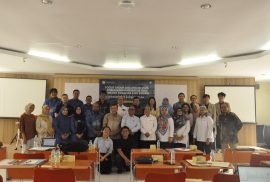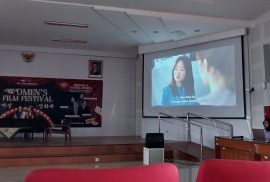Yogyakarta, Monday, November 11th, 2024. The Faculty of Cultural Sciences of Universitas Gadjah Mada held a Focus Group Discussion (FGD) with the Regional Planning, Development, Research and Development Agency (Bappeda) of Siak Regency, Riau Province, in the context of planning the development of a Malay cultural center by Siak Regency. The implementation of the activity began at 10.00 WIB to 14.00 WIB in the Multimedia Room Gd. Margono 2nd floor, Faculty of Cultural Sciences UGM, inviting representatives from Bappeda Siak and a number of lecturers from FIB UGM as presenters.
The activity began with remarks from representatives of Bappeda Siak Regency which were then followed by remarks from the Dean of Faculty of Cultural Sciences UGM, Prof. Dr. Setiadi, M.Si., as an opening for FGD activities. Next, the handover of souvenirs as a symbolic series guided by Mrs. Novi Siti Kussuji Indrastuti, M.Hum., as Master of Ceremony. The activity was divided into two material sessions, with the first session filled by presenters such as Agus Indiyanto, S.S., M.Si., Dr. Sailal Arimi, S.S., M.Hum., and Dr. Arif Akhyat, M.A.. The second session was then continued by the speakers, namely, Dr. Sudibyo, M.Hum., Novi Siti Kussuji Indrastuti, M.Hum., Dr. Popi Irawan, S.S., M.Sc., and Dr. Widya Nayati, M.A..
The implementation of the Siak Regency Bappeda Focus Group Discussion with the Faculty of Cultural Sciences UGM is an important moment of cooperation between the two agencies. FIB UGM through its academics can provide solutions and reference material that can help Bappeda Siak Regency in the plan to build a Malay cultural center.






